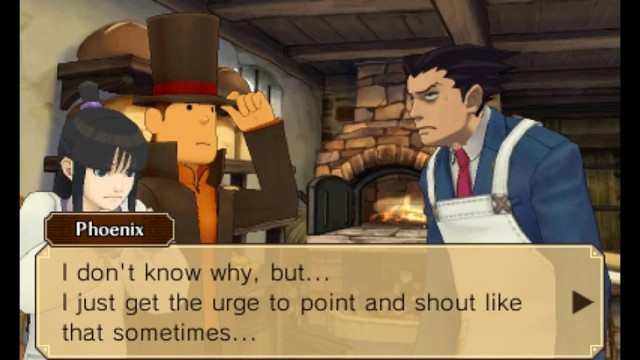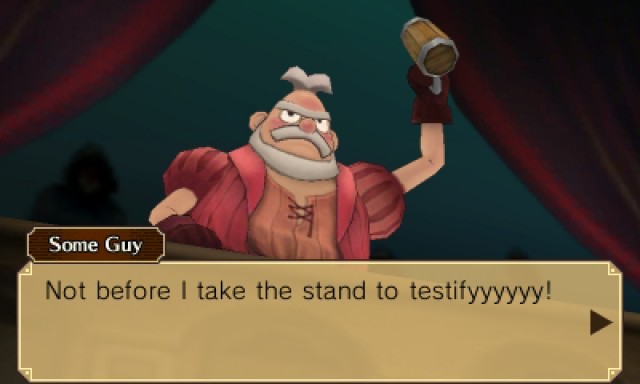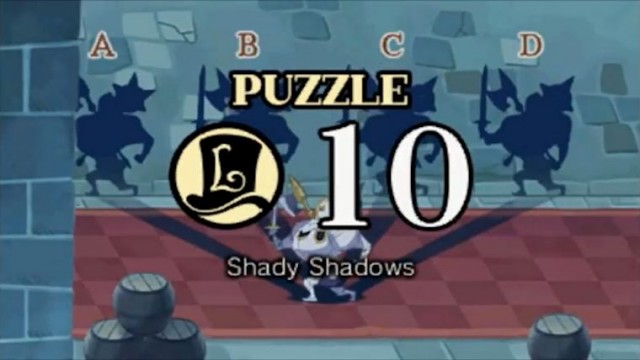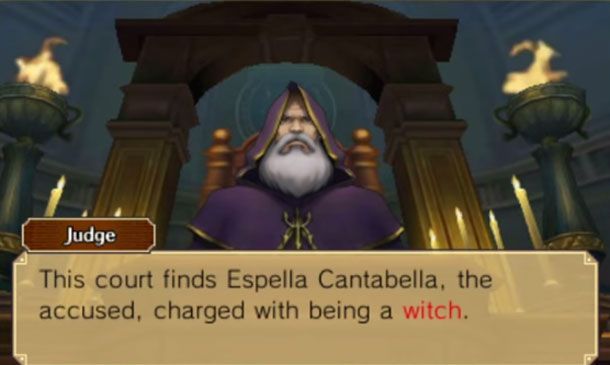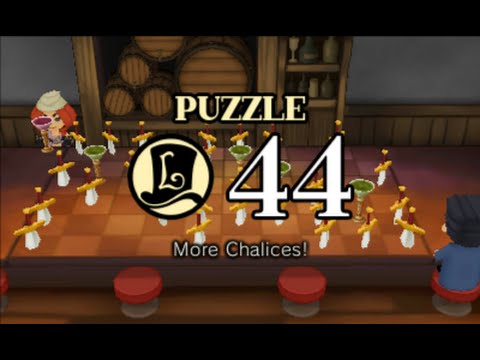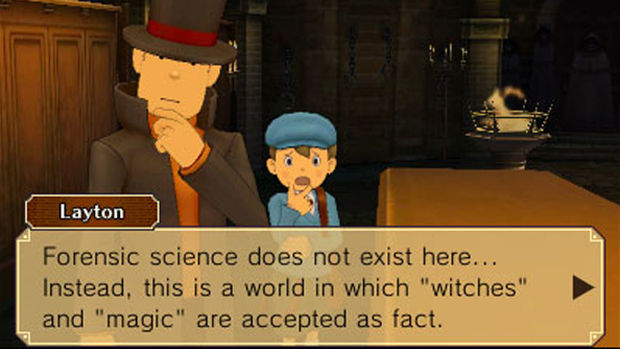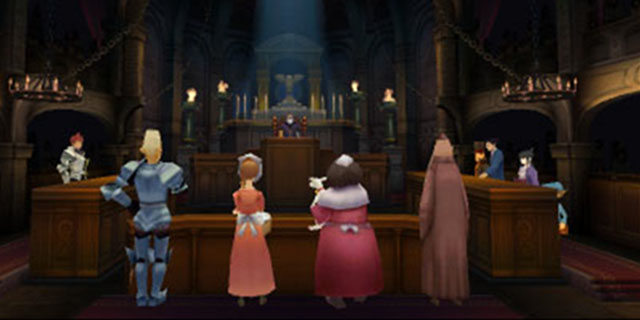When it comes to testing your mental mettle on Nintendo’s recent handhelds, it doesn’t get better than both Professor Layton and Ace Attorney! One can only imagine then how much better both franchises would be if they were blended into one game!
Such is the goal of Professor Layton vs. Phoenix Wright: Ace Attorney, a highly demanded 3DS crossover offering that fans in the West have pleaded for since its initial launch in Japan, all the way back in 2012. After localization efforts finally became underway, Europe and Australia received the game in the early months of 2014, but only recently has the crossover finally come to North America. Level-5 programmed the game itself, while Capcom designed the art and sound assets, and the respective developers handled their usual Professor Layton and Ace Attorney designs respectively, with both Level-5 and Capcom collaborating on the story. Nintendo also published the game themselves in the West, whereas Level-5 did in Japan, much like the case with any other game featuring the top-hatted professor to date.
As exciting as the prospect of a Layton/Wright team-up is, it doesn’t come without compromise unfortunately, as both styles of gameplay have been watered down a tad. This is likely to avoid alienating singular Ace Attorney fans with too much puzzle gameplay, though singular Professor Layton fans will no doubt have an easier time acclimating to the perjury-hunting trial sections from Ace Attorney, which they can simply view as just another puzzle. Thus, don’t expect the best of either series in this crossover, particularly since its storyline is largely considered non-canon for both franchises.
That said however, fans of both games are especially in for a treat here, as the same quaint settings, adorably humourous writing and loveably eccentric characters are preserved from both. It’s a shame that Layton, Wright and their assistants are simply sucked into a parallel world, making them the only established characters of either series to actually interact in the crossover, but at least this new mystery is an interesting and creative one on its own merits.
Professor Layton vs. Phoenix Wright: Ace Attorney will not challenge you nearly as much as a dedicated Professor Layton or Ace Attorney game would, but as a loving tribute to both franchises, and a potentially great way to get your feet wet with the one you haven’t tried yet, Professor Layton vs. Phoenix Wright: Ace Attorney is ultimately worth checking out by fans of one or both as a charming curiosity.
With Capcom handling the visual assets in Professor Layton vs. Phoenix Wright: Ace Attorney, you can imagine that the graphics are slanted a bit in favour of Ace Attorney over Professor Layton. This is sometimes evident, as the familiar Professor Layton personalities, however few there are, look a bit odd, with altered proportions and animations compared to the Professor Layton series’ two dedicated 3DS offerings in particular. They’re perfectly recognizable, but the anime-style Ace Attorney graphics look better-realized and detailed.
Mind you, Professor Layton vs. Phoenix Wright: Ace Attorney is still noticeably out-classed by Phoenix Wright: Ace Attorney – Dual Destinies in terms of visuals, so far the one dedicated Ace Attorney game available for 3DS. This is likely because the crossover was originally developed and released in Japan in 2012, making it appear a bit visually behind both Professor Layton and Ace Attorney as they currently stand on 3DS. It’s still a colourful and perfectly pleasant-looking adventure, but as with the gameplay, the graphics don’t represent the very best of either franchise.
The 3D effect compensates a bit if you opt to crank the 3D Slider however, since it’s quite potent, and creates a huge sense of added immersion. Some of the puzzles even nicely incorporate 3D, as do the dynamic camera angles during some of the melodramatic courtroom animations, making the 3D elements of the game easily come off as the most visually polished and ambitious. It’s not essential to the experience for those preferring to play in 2D, or those who would be playing the game on a 2DS, but you definitely get the most out of Professor Layton vs. Phoenix Wright: Ace Attorney if you play it with maximized 3D effects.
Taken as 3DS visuals on their own merits, Professor Layton vs. Phoenix Wright: Ace Attorney looks solid enough, but it’s evident that it originally debuted in 2012, pre-localization. At least the hyperbolic animations and declarations of Ace Attorney give everything a nice sense of energy though, even if they occasionally clash with the more reserved, quaint tone of the Professor Layton series.
While the visuals seem to have gotten the most love from the Ace Attorney side, the music seems to skew a bit more towards the Professor Layton style. The accordian, piano and string-style Professor Layton composition makes up most of the soundtrack, and the familiar themes from Ace Attorney even appear to be remixed to follow this style.
With that said, at least the zippy Ace Attorney tempo still shows up every now and again, even if the instrumentation definitely follows Professor Layton most heavily. Fortunately, Ace Attorney fans aren’t left out in the cold by any means, as the punchy, perpetually upbeat anime-style sound effects of Ace Attorney constantly play throughout the game, even overlaying the Professor Layton-style dialogue and gameplay. Unlike the occasionally clashing art styles, the Ace Attorney-style sound effects work well with the more laid-back Professor Layton gameplay, since they make it more engaging.
The original Japanese release has more frequent voice work, but only select snippets of gameplay, along with all of the FMV sequences that unfold at key points in the story, are voiced in the Western release. Phoenix and Maya’s voice actors are entirely new in the crossover (particularly since Maya has never appeared in a spoken role before), though Professor Layton is still voiced by his usual voice actor, Christopher Robin Miller. North American players will be a bit jarred by Luke however, as he’s voiced by Maria Darling now, not his usual voice actress, Lani Minella. Normally, Minella re-dubs Darling’s voiceover for the North American Professor Layton releases, eliminating Luke’s cockney accent from the U.K. and Australian releases, in which Darling has always been Luke’s voice actress. In the crossover however, Luke’s U.K. voice work has been left untouched, which may initially confuse North American players.
That said however, the voice work is well done, albeit strangely slapdash in the Western releases. The voiceovers seem to start and stop at random in the English version, as if the Western localization team dubbed whatever they could in English, and then just ran out of time and left the rest silent. It occasionally feels sloppy, and it makes the Western releases of Professor Layton vs. Phoenix Wright: Ace Attorney feel disappointingly less well-produced than the original Japanese build.
Ultimately though, that’s a nitpick, as the game’s writing is still quite well done, even if it’s at its best when the game’s interesting personalities are able to speak it aloud.
As the title suggests, Professor Layton vs. Phoenix Wright: Ace Attorney aims to combine the gameplay styles of both franchises into one adventure. The familiar courtroom trials from the Ace Attorney series unfold during key points of the story, while the investigation portions of Ace Attorney are substituted for the UI and puzzle-solving challenges of Professor Layton.
Again, both franchises are at their most simple here. More advanced mechanics like the trunk minigames from Professor Layton or the Psyche Locks from Ace Attorney are not present at all in this game. Instead, the bare fundamentals of Professor Layton’s puzzle-heavy adventuring and Ace Attorney’s contradiction-catching courtroom cross-examinations serve as the gameplay backbone of a game that, as you can imagine, amounts to a lot of reading text.
The game takes place within the mysterious village of Labyrinthia, which appears to be removed from the real world. Labyrinthia is a town steeped in medieval design and manner, with the greatest threat being witches, who are tried and sentenced to death by fire in the ‘Witch Trials’. Since forensic science and technology don’t exist in Labyrinthia, the town is unfamiliar with a sense of logic or deduction, which is where Professor Layton and Phoenix Wright come in, having ended up in the town due to separate mysterious circumstances, along with their respective assistants, Luke Triton and Maya Fey.
Much of the game involves trying to protect a young girl named Espella Cantabella, who is believed to host the mythical Great Witch, Bezella, said to have brought destruction to Labyrinthia in the distant past. If Espella is put to the flames, Labyrinthia will no longer have witches, and the Witch Trials can end. Needless to say however, it’s not that simple, and players must work with both Professor Layton and Phoenix Wright to get to the bottom of Labyrinthia’s mystery, and how they even ended up in a town of magic and witches in the first place.
As mentioned, whenever you’re outside of the courtroom, you use the familiar point-and-click interface of the Professor Layton games to move about Labyrinthia, tapping on points of interest and townsfolk to get new information, and potentially advance the story. Certain objects and people can’t be utilized however, unless you solve the puzzles they present to you. Professor Layton vs. Phoenix Wright: Ace Attorney has 70 puzzles in all, which will no doubt feel scant to Professor Layton fans, particularly since this game doesn’t feature any of the Daily Puzzles or Layton’s Challenges that you can access in the dedicated Professor Layton titles.
Nonetheless, the puzzles take a similar form as they do in the Professor Layton games. They can include logic puzzles, math puzzles, maze puzzles, visual puzzles, and other derivations thereof. Solving puzzles earns you Picarats, depending on how many attempts it took to input the right answer, which can be used to access post-game bonuses. That should be quite familiar to Professor Layton fans. Even winning trials will net you Picarats, with more Picarats earned for every damage point you didn’t expend when presenting evidence.
During the Witch Trials, gameplay unfolds in the Ace Attorney style. Players listen to witnesses recount testimonies, then, during a cross-examination, they use the evidence in their Court Record to point out lies and contradictions in witness testimonies. Presenting the wrong evidence will expend a damage point, and if you expend five damage points, you lose the trial, and it’s Game Over, with players having to reload their previous save.
Like the puzzles, the trials are simplified for newcomers that are coming as fans of Professor Layton. Unlike the dedicated Ace Attorney games, Professor Layton vs. Phoenix Wright: Ace Attorney also allows you to use Hint Coins during cross-examinations and evidence prompts to provide clues as to the problem’s solution, much like you can in the Professor Layton-style puzzles, with Hint Coins being found in Labyrinthia proper whenever your magnifying glass cursor sparkles and you tap the touch screen. This will help make the trials accessible for Professor Layton fans, particularly since avid Ace Attorney players can simply opt not to use Hint Coins during the Witch Trials.
Ace Attorney fans will however be undeniably disappointed that, for whatever reason, Professor Layton vs. Phoenix Wright: Ace Attorney doesn’t allow you to use the 3DS mic. This means that you can no longer verbally shout, “Objection!” and other such declarations during the trial portions, which takes a bit of fun out of the experience. You’d think that the crossover wanting to entice Professor Layton fans to the Ace Attorney series would mean playing up this fun feature, the omission of which feels like a considerable missed opportunity. It won’t matter to people who have always played Ace Attorney without using the mic, but for those that do use the mic, it’s a heartbreaking omission from the crossover.
Professor Layton vs. Phoenix Wright: Ace Attorney tries to compensate with a new clever hook though, that being the ability to cross-examine multiple witnesses at the same time. This is a cool feature, as it means that you can press one witness, then while that witness is speaking, you can listen for another witness to make a noise, then use the touch screen to move to them and question why they appear to have made a sound. This allows you to probe witnesses suddenly remembering things, seeing problems with other witnesses’ testimonies, and also to find contradictions when otherwise perfect testimonies suddenly don’t tell the same story.
The feature works a bit better on paper than it does in practice at times though. If you’re stumped, it often means continually sifting through the same drawn-out dialogue to find the right witness to probe at the right time, which can get tedious. The decreased difficulty won’t make this problem all that frequent for Ace Attorney fans, but it’s annoying to have to keep tapping the touch screen or the A Button to keep having witnesses repeat themselves because you questioned one witness, then said questioning ended up leading nowhere.
On the note of the difficulty, it bears repeating that both gameplay styles have been simplified from their dedicated games too. Fans of either franchise will probably find themselves mostly unchallenged by the puzzles and/or trials, and those who are already fans of both franchises will find Professor Layton vs. Phoenix Wright: Ace Attorney to especially be a cakewalk compared to the dedicated games in either series. The insane count of Hint Coins throughout the game makes things even easier as well, meaning that players who don’t mind flexing their brains will rarely, if ever, get stuck.
Fortunately, Professor Layton vs. Phoenix Wright: Ace Attorney at least presents a meaty adventure, clocking in it around 20 hours or so. This substantial length is extended a tad by some bonus episodes and puzzles that you can access after beating the game, but they’re a poor replacement for the Layton’s Challenges and Daily Puzzles from the Professor Layton series, even if Ace Attorney fans are no doubt used to the lack of replay value at this point. Players do get their money’s worth in the main adventure, but once that’s done, there’s virtually no reason to ever revisit the game, which is unfortunate.
Even if the gameplay styles don’t always mesh perfectly, they mesh well enough to justify the crossover, and it’s fans of both franchises that will get the most out of the experience. People looking for better mental workouts would do well to play the dedicated Professor Layton and/or Ace Attorney games first, since Professor Layton vs. Phoenix Wright: Ace Attorney is noticeably on the easy side, but as a tribute and/or gateway for both brands, it’s fun, rewarding and novel in its own right.
The storyline for Professor Layton vs. Phoenix Wright: Ace Attorney has a surprising amount of trouble trying to find common ground between the two franchises. The overarching mystery of Labyrinthia definitely skews more heavily toward Professor Layton plot sensibilities, though the style and pace of the plot seem more inspired by Ace Attorney. Again, there’s times where the blend is awkward, but the final result of the mystery is worth getting to for fans of either series.
What’s most unfortunate though is that the characters had to be removed from either of their natural habitats. This may have been a potential way to avoid playing favourites, with Professor Layton being set in Europe, and Ace Attorney being set in the U.S. (or Japan, in the case of its original Japanese builds). Still, it’s another surprising missed opportunity for the crossover, since the various supporting personalities of both Professor Layton and Ace Attorney are now entirely absent. Fans will wish they could see Professor Layton matching wits with Miles Edgeworth, or Phoenix Wright trying to deal with the gruff and impatient Inspector Chelmey. Instead, they’re both dropped in an all-new location, filled with all-new characters that are still nicely charming, but not nearly as memorable as those in the dedicated Professor Layton or Ace Attorney games.
The title also feels like a bit of a misnomer, as Professor Layton and Phoenix Wright predictably spend almost the entire game as allies, as do Luke and Maya. There is a big dramatic showdown between the two for the finale, but, without giving anything away, it’s not the epic battle of wits you may imagine by any means, and it makes the crossover border on false advertising.
Still, while the plot fails to compare to just about any other Professor Layton plot, nor does it compare to the vast majority of the Ace Attorney cases to come before, it works well enough on its own merits. It’s predictably a sidestory that is not official canon for either franchise, though if fans choose, there’s enough leeway to slip the crossover into both timelines, even if its events are purely self-contained for both of its title characters. After all, even if the story is merely so-so for the standards of either series (albeit still better than the majority of video game plots), it’s still appealing to think about these great characters both sharing a universe, despite being owned by different companies.
Professor Layton vs. Phoenix Wright: Ace Attorney may be a slight disappointment for those expecting a game that compares to the usual high-quality standard of both properties simultaneously. Instead, you’re getting the foundations of both franchises in a more simplified mystery, one that seems initially bizarre and out-of-place for fans of either franchise, but one that at least has a resolution that satisfies, even if the abstract, oddball premise does inevitably lead to some plot holes. Fans of either series, or especially both of them, will probably find the crossover to be a bit too easy and simple, but that doesn’t mean that it isn’t fun.
In fact, for any flaws that this game may have, I’m glad it exists, and I’m definitely glad that it was eventually localized and brought to the West, even if it took a very long time to make that happen. Both Professor Layton and Ace Attorney are great game franchises for people who love testing their mental mettle, and they do create an interesting blend when combined. It may not be the best of either brand, but it’s a blend that succeeds at capturing the charm and whimsy of both franchises together, as well as offering a nicely lengthy adventure, and simply standing as a bold, creatively satisfying experience that’s quite unlike anything else on the 3DS.
Again, it’s best that you be familiar with at least one of these franchises before trying the crossover, since it’s a game that’s definitely designed with established fans of Professor Layton and/or Ace Attorney in mind. If you already like one, this is a good introduction to the other, and also makes for an especially great tribute if you already like both. The crossover’s lightweight difficulty makes it best enjoyed as a novelty and a charming little odyssey into the hypothetical, but even if both Professor Layton and Phoenix Wright have separately taken on far more complex and fulfilling mysteries, seeing them work together on this one at least manages to be an amusing delight.
Hopefully, this won’t be the last mystery that the professor and the attorney solve together.


